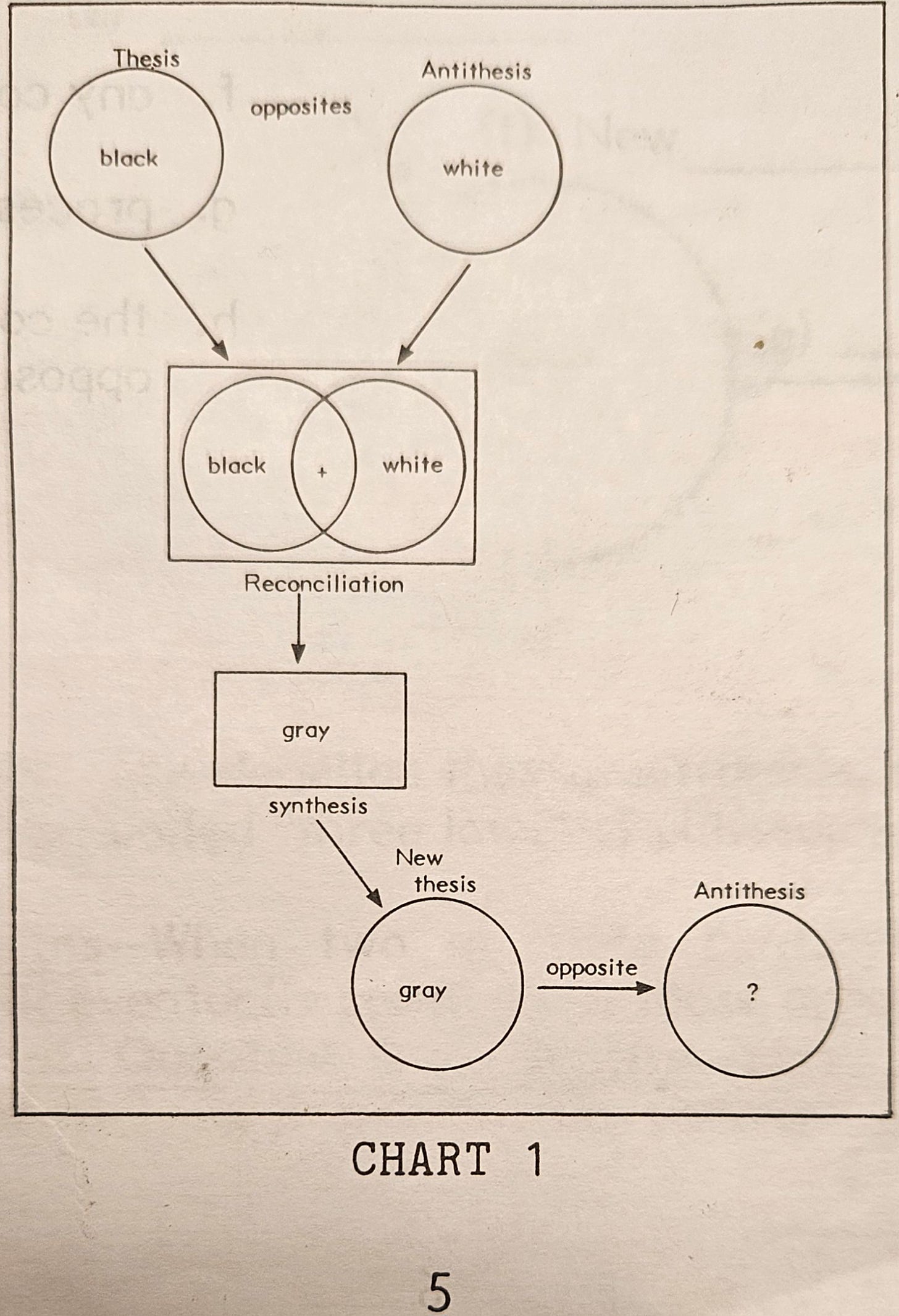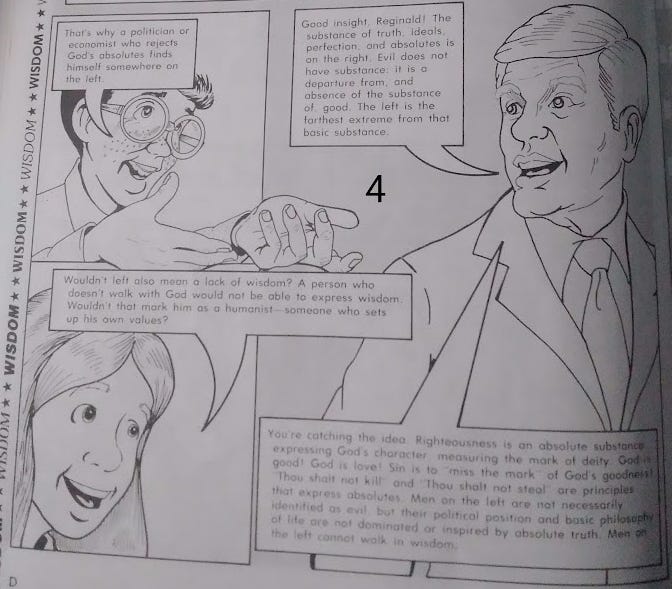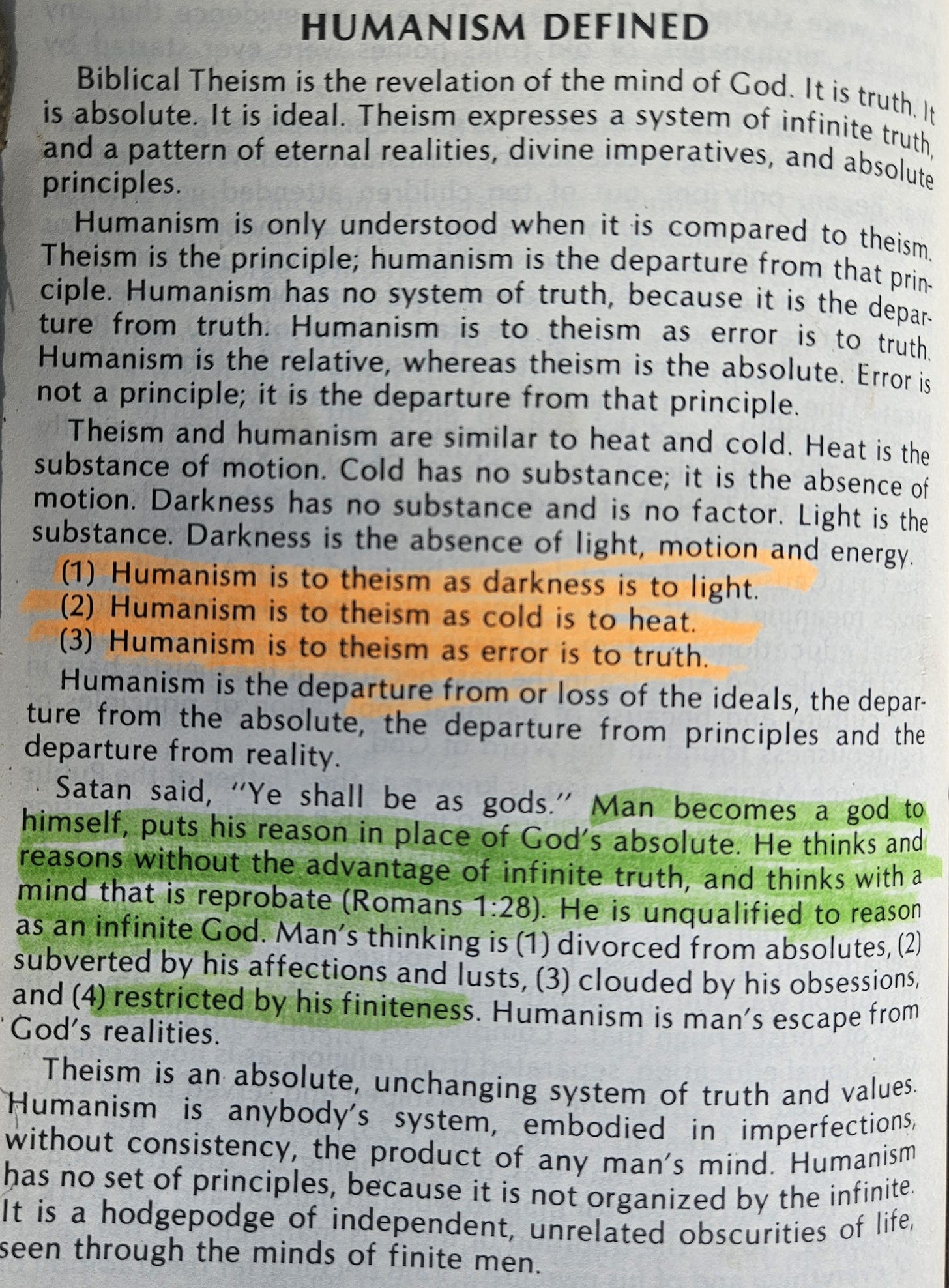Collectivism 136, Part 3: Hegelian Dialectics and the Phenomenology of the Donald
Written 1981, No Revisions
Heyo! Welcome back to Safe White Space!
This is Part 3 of my review on Collectivism 136, a Packet of Accelerated Christian Education (PACE), authored by Donald Howard. If this is your first time checking in and need some context, I suggest you start with Part 1 of Collectivism 133, where I explain what the PACEs are and broadly how ACE operates:
Collectivism 133, Part 1: Lucifer, the Son with Morning Wood
Today’s content builds on the Hegelian theories we discussed in Part 2 of this review. If you missed that I recommend you at least skim the details, so that we’re all on the same page.
We are going to finish up Collectivism 136 by exploring Hegel’s philosophy, as relayed to us by Donald in the ACE curriculum, but we’re also going to do something fun while we’re at it. I really enjoy exploring his manifestos and finding the direct links between them and the PACEs. Further, if you let a moron talk long enough, especially one who has convinced himself that God specifically chose him to save America the world through education, you get some reeeeally juicy insights into said person’s mind. In Donald’s case, these insights typically explain why the PACEs are written the way they are.
With that in mind, we are going to dip into Donald’s Rebirth of Our Nation (1979), and watch him poorly reword Hegel’s ideas and pass them off as his own. You can’t ‘steal’ a philosopher’s ideas, but typically philosophers will build up or deconstruct each other’s work in a way that doesn’t pass the original concept off as their own. For example, Karl Marx built his philosophy of Dialectic Materialism off of Hegel’s concept of Dialectics. Marx didn’t steal Hegel’s ideas; he built upon what was true, and deconstructed what was false (as he saw it).
On the other hand, Donald presented Hegel’s ideas as the stupidest thing he’d ever heard of, in this PACE. Yet, at the same time, he was very clearly repackaging aspects of Hegelian Dialectics as his own. Again, very poorly, but there’s something jarring about Donald’s overly confident misunderstanding of Absolutism and Relativity. Especially, when it’s juxtaposed with his belief that he had the ability “to reason as an infinite God.” No, I shit you not.
This has been honestly the most tedious post to prepare for and research, but the pay off is worth it.
Before we get there, let’s revisit an old Exhibit:
Exhibit 3
The substance of Truth, Ideals, Perfection, and Absolutes is on the RIGHT. The Left is the furthest extreme from that basic element. Evil in Scripture does not have a substance; it is a departure from that substance or an absence of that good. Righteousness is an absolute expressing God's character, measuring the mark of deity. Sin is to "miss the mark." "Thou shalt not kill" is an absolute. Hegel said, "There are no absolutes." He was over on the Left.
World Awakening, page 80
Donald can’t help but describe his philosophy of Absolutes in terms of relativity. It’s astounding how someone can write “The Left is the furthest extreme from that basic element,” and not take a beat and think, “furthest?” If something is, “measuring the mark of deity,” there are necessarily some things that will measure closer to deity than others. Which, if you’ll recall from my second post, puts Donald riiiiight between Jesus and God on that sliding scale. We also discussed in God Votes Republican that “Thou Shalt Not Kill” isn’t an absolute by anyone’s standards, much less the very pro-genocide, pro-slavery Donald.
I mean, how else do you secure “God’s natural order of things”? [Ex. 141]
The fact that this thought can go from Donald’s pen to paper to publishing just proves how little “God” had to do with any of this education. I’ll post Exhibit 1181 below so you can see that this pigshit pops up in the PACEs, in the exact same wording and tone.
Last thing, “There are no Absolutes,” is one of those Hegelian contradictions we talked about last PACE. If there are no absolutes, than the statement is false, because the statement itself is an absolute. It’s similar to “this statement is false.” What Donald did here was step on a rake in his attempt to dunk on a dead man.
This is like when anti-vaxx freaks post a link to a medical journal that they think proves their point, but actually discredits their entire position.
With Donald’s framework of pseudo-Absolutism in mind, let’s hop back into Collectivism 136, picking up on page 5:
Exhibit 180
In Hegel’s system, relation was of the highest essence. Every idea was merely a group of relations. Human beings, Hegel believed, could conceive of something only by relating it to something else. Of all possible relations, Hegel claimed, the most basic were those of contrast and change.
Collectivism 136, page 5
This is the least controversial idea anyone has ever had, but because it’s Hegel saying so, it must to be high-minded absurdity.
Relation is what is going on when we empathize or sympathize with another person. We are recognizing someone else’s conditions (mental/physical/whatever) and relating to them as best we can. We can’t ever know exactly what someone is going through or feelings, but we can try.
To go back to a previous example, relation is what’s happening in our brains when we say “the sun is rising.” We know that, in reality, the sun isn’t doing anything. Rather, it’s the earth putting in the work, but that information isn’t helpful to us when we’re trying to find out what time of day it is. What we’re doing is relating to the sun’s position in our sky.
Everything is filtered through our personal perspectives. According to Hegel, the bulk of the human experience and exercising free will, is recognizing the relativity inherent to our perspectives and acting upon that awareness. Much of this we discussed in the last post, so I’m not going to retread this material.
In Donald’s manifesto Rebirth of Our Nation, he defined Humanism, the catch-all term for Commies, Gays, Satanists, and all the other interchangeable labels by relating to them, just like Hegel would. I’ll post a picture in the footnotes2 of this page so you know I’m not playing with it. I really enjoy discrediting Donald’s philosophy and character, because it discredits the whole foundation of Accelerated Christian Education.
In this case, we’re going to use this Exhibit from Donald’s manifesto to demonstrate that, not only was Hegel correct in his assumptions about relativity, but Donald was wholly bound by this same relativity.
The first paragraph sounds exactly like a Christian version of Hegel’s “Absolute Idea”:
Exhibit 181
Humanism Defined
Biblical Theism is the revelation of the mind of God. It is truth. It is absolute. It is ideal. Theism expresses a system of infinite truth and a pattern of eternal realities, divine imperatives, and absolute principles.
*PAUSE*
As a reminder, in Part 2, Donald disparaged Hegel for thinking of the “Absolute Idea” as “merely the culmination of ultimate thought.” [Ex. 178] YET, Donald proffered that “the revelation of the mind of God.. is absolute. It is ideal.”
Call me crazy, but one of these things is exactly like the other.
Also, keep that “system of infinite truth and a pattern of eternal realities” in the back of your mind. It becomes important.
Next, Donald conceives of a thing, but only by relating to it, just like Hegel said he would.
*UNPAUSE*
Humanism is only understood when it is compared to theism.
Theism is the principle; humanism is the departure from that principle. Humanism has no truth, because it is a departure from that truth. Humanism is to theism as error is to truth. Humanism is the relative, whereas theism is the absolute. Error is not a principle, it is a departure from that principle.
Theism and Humanism are similar to heat and cold.
Heat is the substance of motion. Cold has no substance; it is the absence of motion. Darkness had no substance and is no factor. Light is the substance. Darkness is the absence of light, motion and energy.
(1) Humanism is to theism as darkness is to light.
(2) Humanism is to theism as cold is to heat.
(3) Humanism is to theism as error is to truth
Humanism is the departure from or loss of the ideals, the departure from the absolute, the departure from principles and the departure from reality.
**Baby boy, we get it.
When you read this next bit, keep the polarity of the previous four paragraphs in mind, as well as that “pattern of eternal realities,” and consider what that implies.**
Satan said, “Ye shall be as gods.” Man becomes a god to himself, puts his reason in place of God’s absolute. He thinks and reasons without the advantage of infinite truth, and thinks with the mind of a reprobate (Romans 1:28). He is unqualified to reason as an infinite God.
**If Humanists don’t have “the advantage of infinite truth,” or don’t have the capacity “to reason as an infinite God,” that implies someone or some group of people does. Given all I’ve covered before this post, we can all agree that someone is Donald/Christians.
This next bit reads like projection**
Man’s thinking is (1) divorced from absolutes, (2) subverted by his affections and lusts, (3) clouded by his obsessions, (4) restricted by his finiteness. Humanism is man’s escape from God’s realities.
Theism is an absolute, unchanging system of truth and values. Humanism is anybody’s system, embodied in imperfections, without consistency, the product of any man’s mind. Humanism has no set of principles, because it is not organized by the infinite. It is a hodge podge of independent, unrelated obscurities of life, seen through the minds of finite men.
Rebirth of Our Nation, page 112
Cool.
I’ve been dying to cover this page because it’s been living in my head, rent free ever since I read it a year and change ago. There is something so uncomfortably hilarious about someone who claims God chose them to deliver America from the clutches of Satan when this is all they got. God chose you to rewrite Christian education, yet your dumber than shit.
‘Here, I’m going to define my enemy in clear and concise terms. So, you know how hot and cold are different? Yes! That’s exactly like Christianity and Humanism!’
I can(‘t) see why God chose you…
Alright, now that we’ve used Donald to demonstrate that Hegel was correct. Here Donald explains the “key” to Hegelian Dialectics:
Exhibit 182
The dialectic (“process” or “dynamic pattern”) is the key to Hegelian, and all subsequent, communist philosophy. Any given condition, or thesis, is contrasted with its natural opposite, or antithesis. The thesis and antithesis reconcile to form synthesis (the essence of both thesis and antithesis). An example of the “thesis-antithesis-synthesis” process in history, asserted Hegel, was as follows: conservatism (thesis) is opposite to radicalism (antithesis) and thus by means of “dialectical movement,” the former is attracted to the latter and the two opposites reconcile to form liberalism (synthesis). When a thesis and antithesis reconcile to form a synthesis, that synthesis becomes a new thesis which inherently has it’s own antithesis.
Collectivism 136, page 5
Honestly, that explanation was fine despite Donald entirely making up that assertion of Hegel’s (conservatism - radicalism - liberalism), but it’s not too bad considering this is Accelerated Christian Education. This next bit is where it all goes wrong.
I’ve mentioned this before, but Hegel never asserted that we could “arrive” at the Absolute Idea, or at a place where contradictions no longer exist. He did believe it was possible to enter a state of contradiction that was most tenable under whatever the given circumstances. To put it another way, not every thesis and antithesis reconcile to form a synthesis. I’m sorry I’m not spending more time explaining this, but anything I say will immediately become irrelevant because right after this lazy but decent explanation of Hegel’s theory, Donald decided ‘fuck it.’ Instead of demonstrating Hegelian Dialectics using real life examples (which would demonstrate that Hegel was correct, at least in part, in his assumptions), he decided to use colors.
COLORS!!
And not like, ‘Blue (thesis) combines with yellow (antithesis) to make green (synthesis). Then green (the new thesis) combines with red (the new antithesis) to make brown (the new synthesis), etc.’
He used black and fucking white.
Check this weaponized ignorance out:
Exhibit 183
[**CONTINUES ON THE TOP OF NEXT PAGE**]
The difficulty in finding an “opposite” to gray demonstrates a difficulty with Hegel’s system. It is as hard to define a new antithesis in ideas as it is in colors!
Collectivism 136, page 5, 6
No it isn’t. You stupid, disingenuous fuck. This is weaponized ignorance, repackaged and sold as “superior Christian educatgion.”[sic] [Ex. 100]
Seriously, pick any other example. Hegelian dialectics works with so many things. History, math, physics, and chemistry are extremely easy examples. Consider the San Domingo “sugar trade slave colony” mentioned in Collectivism 135 (which the PACE claimed is “God’s natural order of things”), where you have one of the largest and most brutal slave colonies making record profits for rich aristocrats in France. Just in that one sentence you can derived many contradictions and opposites that need to be reconciled.
Let’s focus on the most obvious. Namely that, if there are slaves (the thesis) than there necessarily must be slave masters (the antithesis) - contradictions. These two opposites (contradictions) collided and in 1791, a rebellion began in San Domingo. In 1804, the Haitians won their independence (synthesis). Yet, as soon as the Haitians won their independence, immediately, new opposites took shape. After independence, a new class system formed and economic conditions created new theses/antitheses which have been forming, clashing, combining, and reforming ever since, just like anywhere.
Consider the fact that the Romans put Jesus to death, and then approximately 370 years later, Rome is declaring Christianity as it’s official religion. Contradiction, opposites, reconciliation. Oh, but it’s impossible to do this process using black and white, so naturally, it must all be Satanic bunk.
Any Hegel fans will notice that I’m leaving out Negation, the Unity of Opposites, the Negation of the Negation, etc. That’s because these are complex topics and this PACE contains literally one sentence about each of these, making them not worth our time. It would amount to me rewriting ACE’s curriculum for them, which I can’t do, but wouldn’t if I could. Where we’ll finish off this PACE is Donald’s conclusion of Hegel:
Exhibit 184
A Frenchman once asked Georg W. F. Hegel to explain his philosophy in one sentence. Hegel’s answer filled ten nearly incomprehensible volumes. Soon all the world was talking about Hegelian theories, but nobody (probably including Hegel himself) really understood them.
Collectivism 136, page 9
Talk about “incomprehensible volumes.” Pure projection, through and through. Donald didn’t get it, so it must be that nobody did. Everyone else was only pretending to get it, even Hegel… Only far-right loons would argue that defining your philosophy in one sentence is a good quality. I don’t know what else to say about this.
Any student would be smarter by not taking this PACE course.
I think it’s time to shift gears again. We have two more PACEs in this series, but I’m getting a little burnt out by the raw academic stuff, so I think we are going to transition into covering Donald’s attempt to bring about Armageddon. No, seriously, this dude had a very serious plan with his pals to bring about the return of Jesus “on or about the year AD 2000” in a way that, if true, would make Donald the very center of the universe.
Thank you for reading!
But whoso shall offend one of these little ones which believe in me, it were better for him that a millstone were hung around his neck, and he were drowned in the depth of the sea.
Matthew 18:6








oh my god “gray —> ?” made me roll my eyes soooooo hard that’s hilarious